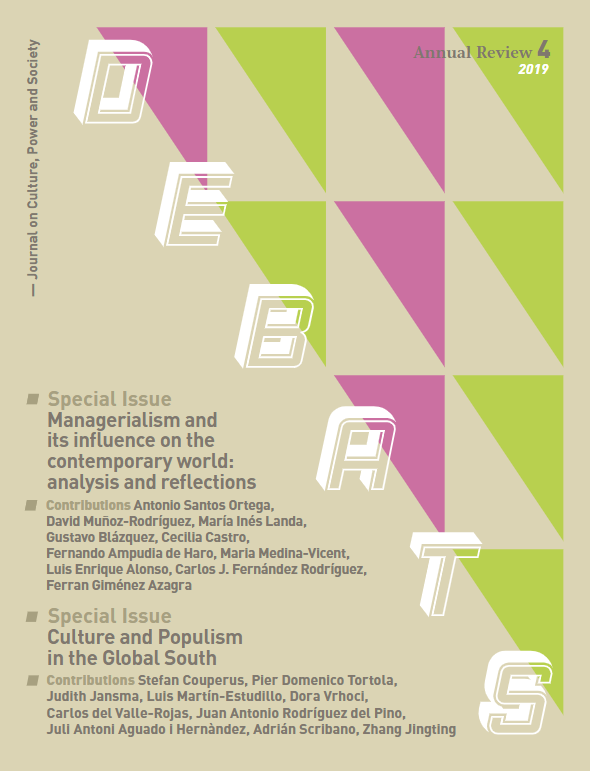Culture in the Name of the People? Towards a typology of populism and culture
DOI:
https://doi.org/10.28939/iam.debats-en.2019-10Resumen
Populism is a topic that has been widely studied over the past decades but mostly from a political perspective. These contributions mainly focus on the analysis of populism as a (socio) political phenomenon placed in a historical, global context. A second field of interest covers the mass appeal of populist parties. The latter is not only a timely, highly relevant issue right now but also sheds light on the flaws of liberal democracy. While a lot of academic effort has been put into defining populism and explaining the reasons for its success, the underlying cultural beliefs on which populist ‘us and them” dichotomies are based remain unclear. We shall therefore come up with a typology of culture and populism. This typology will reveal how various aspects of culture (such as popular culture, cultural images,
and literary works) are prevalent in the populist construction of ‘us’ and ‘them’.
Based on examples from France and The Netherlands (two countries with major right-wing populist parties), the typology will differentiate between sociofacts, mentifacts and artifacts (cf. Huxley), and their use and appropriation by populist actors. The artifacts category comprises what I call ‘organic authors’ and ‘appropriated authors’, a terminology borrowed from Gramsci. The difference between the two, as will be shown, is the author’s identification with and articulation of certain kinds of ideas
Descargas
Descargas
Publicado
Cómo citar
Número
Sección
Licencia
Sin perjuicio de lo dispuesto en el artículo 52 de la Ley 22/1987 de 11 de noviembre de Propiedad Intelectual, BOE del 17 de noviembre de 1987, y conforme al mismo, los autores o autoras ceden a título gratuito sus derechos de edición, publicación, distribución y venta sobre el artículo, para que sea publicado en Debats. Revista de cultura, poder y sociedad.
Debats. Revista de cultura, poder y sociedad se publica bajo el sistema de licencias Creative Commons según la modalidad «Reconocimiento - NoComercial (by-nc): Se permite la generación de obras derivadas siempre que no se haga un uso comercial. Tampoco se puede utilizar la obra original con finalidades comerciales».
Así, cuando el autor o autora envía su colaboración, acepta explícitamente esta cesión de derechos de edición y de publicación. Igualmente autoriza a Debats. Revista de cultura, poder y sociedad, la inclusión de su trabajo en un fascículo de la revista para que se pueda distribuir y vender.











